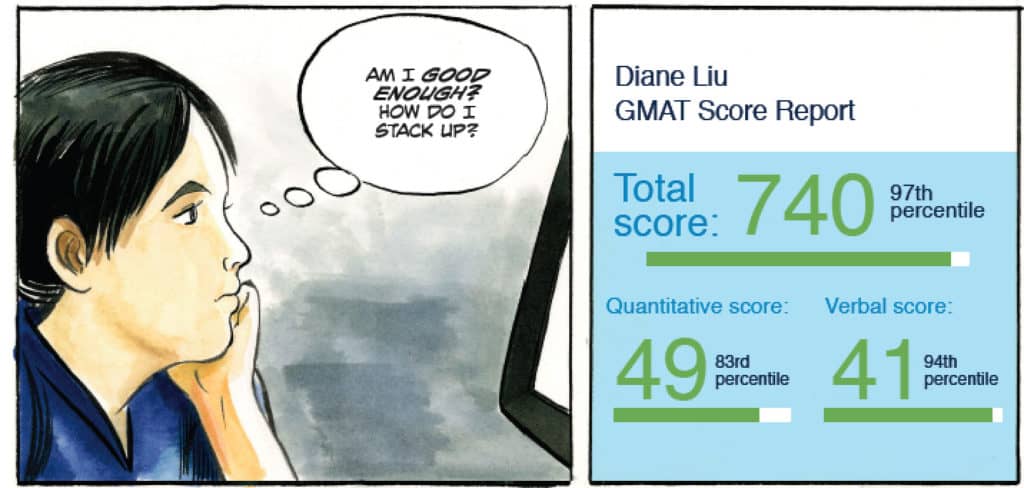By Melody Jones, Co-Founder and President of Vantage Point MBA Admissions Consulting.
Melody earned her MBA from Columbia Business School. Before making the shift to full-time consulting, she worked as a brand manager at L’Oreal. Melody co-founded Vantage Point over 8 years ago, and the firm has served over 950 happy applicants since, including many with low GPAs.
Nothing fills prospective MBA applicants with more regret than a low undergraduate GPA, an inescapable data point memorialized on their undergraduate transcript. Unlike a subpar GMAT score or light extra-curriculars, you cannot go back in time and change your GPA.
If you were focused in college, took your academics seriously, and were fortunate enough not to have any personal circumstances derail you, then you may be proud of your GPA and the story it tells.
But what if it took you a year or two to gain some maturity and apply yourself in your classes? Or perhaps you took too long to switch your major, accumulating some low grades before you made the call. Can you kiss your dreams of a top MBA goodbye?
Fortunately, not necessarily. Now I won’t tell you that a low undergraduate GPA won’t be a hurdle – because it will. But it’s not an insurmountable challenge. With the right strategy, admission to a top MBA program is possible. How do I know?
Well, because I’ve seen it happen for our clients every single year.
If this sounds like you, read on. In this article, I will explore the impact of GPA on MBA admissions, ways to bolster your application, and strategic approaches to increase your odds of acceptance, even if you have a lower GPA.

Before diving straight into tactics, it’s critical to first understand the role of your undergraduate GPA in the MBA admissions process and why business schools care about it so much. After all, it was 4 or 5 years ago.
The good news is that your GPA is only one component of a holistic application. And MBA admissions is inherently a holistic process. However, as a data nerd myself, I want to share a number with you. The 2015 GMAC Application Trends Survey (the most recent year they asked such questions) revealed that, on average, academic transcripts account for 18% of the MBA admissions decision. Interestingly, that was just slightly under the 20% weight given to Exam Scores (which include the GMAT/GRE/EA as well as English language testing for many international applicants).
What these numbers mean is that your GPA is a difference maker and as an applicant, you want to pay close attention to the message it sends.
Fair or not, MBA admissions officers use undergraduate academic performance, including GPA, as a key metric to assess an applicant’s academic capabilities and consistency over time. A strong GPA indicates disciplined study habits, intellectual ability, and readiness to handle the academic rigor of an MBA program. It serves as a predictor of an applicant’s potential success in the program.
Conversely, a low GPA might raise concerns about an applicant’s academic ability, time management skills, or accountability, prompting admissions committees to scrutinize other parts of their application more closely.
There are varying opinions on what constitutes a “low GPA” because no MBA program has ever gone on the record to define the term. However, based on my decade of experience, I consider anything 0.3 or more points (on a 4.0 scale) below the class average (or median) to be low.
For example, Harvard’s MBA class of 2025 average GPA is 3.73. I would consider a GPA of 3.4 or lower to be “low” for HBS. Now that doesn’t mean that this applicant’s chances are doomed. However, it does mean that this applicant should take proactive steps to mitigate and/or address their GPA.
To get a sense for where you stand, you can look at the average GPAs across top MBA program.
As I alluded to above, GPA assessment depends on the schools you’re applying to. However, your undergraduate institution and major also play a role. All GPAs are not created equal. In other words, a 3.4 GPA in a notoriously rigorous major (such as engineering) at a top-ranked national university is not the same as a 3.4 GPA in a communications major at a local college with a 100% acceptance rate. Admissions committees will put your GPA into context.
In addition, an assessment of what is considered “low” can be more challenging for international applicants who attended undergraduate institutions with different grading scales. In those situations, looking at your class rank or finding other credible ways to “translate” your grades onto a 4.0 GPA scale can give you some much-needed awareness of where you stand.
I mentioned above that your academic transcripts account for about 18% of your admissions decision. So, what about the remaining 82%? Those are all the other levers you have at your disposal to offset any negative perception (if any) created by your undergraduate GPA. And yes, it is possible to improve your chances through strategic and thoughtful action. The question is, how hard are you willing to work?
One of the most effective ways to mitigate a low GPA is to achieve a high score on the GMAT or GRE. (Easier said than done, I know!) A strong standardized test score demonstrates your quantitative and verbal reasoning skills and indicates your readiness for the academic challenges of an MBA program. In addition, since your test score is a more recent data point vs. your GPA, an admissions committee may be willing to give it added weight if it enhances their class profile.
So, what score should you aim for? Aim for a GMAT or GRE score that is above the average for your target schools. For the GMAT, I would recommend 20+ points above the average. For the GRE, I would recommend 3+ points above the average on each of Quant and Verbal sections. This can help reassure admissions committees that your undergraduate GPA is not a reflection of your capabilities but rather something else that you have since addressed.

Outstanding work experience, leadership skills, professional accomplishments, and/or career progression can also help offset a low undergraduate GPA. This is best reflected in a compelling MBA resume.
In your MBA resume, focus on quantifiable accomplishments, such as revenue growth or cost savings, to demonstrate your impact. As much as possible, highlight the context of your accomplishments to show just how exceptional they are. Here’s an example to bring this to life:
Can you see how the second bullet point is far more impressive?
Additionally, emphasize any promotions, awards, or recognitions that reflect your professional growth and potential. Extra- curriculars are fair game here as well. To the extent that you showcase your leadership skills and impact both in and out of work, the more desirable you become as a potential member of an MBA community. And the more you help shift the focus from your academic record to your practical, real-world abilities and successes.
In addition to a high test score and killer MBA resume, your best line of defense against a low GPA is your story – captivating the admissions committee with a connected narrative of who you are, what you want, and why. And all of this should make a clear case for the MBA. Savvy applicants will take advantage of every component of the application to tell and support that story.
Your MBA essays are the most obvious and best opportunity to provide context for your GPA and to highlight your strengths, unique experiences, and ambitious goals. The best essays tell a compelling and introspective story about your journey, focusing on your personal growth, challenges you’ve overcome, and your professional achievements. They also provide a clear “why” for your goals in the future and how an MBA degree will empower you to achieve those goals.
The more specific and ambitious you are, the more likely it is that the admissions committee will buy into your future potential and want to align themselves with you along the way.
In addition to their required essays, most business schools offer an optional essay (or statement) where you can explain any gaps or weaknesses in your application, including a low GPA. I recommend you use this space to offer a brief and sincere explanation for your academic performance and then quickly pivot to providing new evidence for why your GPA is not indicative of your academic abilities.
Whether it was due to personal circumstances, health issues, or other factors, provide context without making excuses. Then, highlight any steps you have taken to address those challenges and how you have grown from those experiences. For example, you can emphasize how you developed resilience, work ethic, and time management skills that will contribute to your success in an MBA program.
In addition to the application components you control, glowing letters of recommendation from individuals who can vouch for your skills, work ethic, and leadership abilities can significantly enhance your application. These letters provide a credible and personalized perspective on your professional achievements, potential, and character, highlighting qualities and experiences that grades simply cannot capture.
By choosing recommenders who can speak in detail about your accomplishments, growth, and contributions, you can demonstrate to the admissions committee that your professional competencies and character outweigh your academic shortcomings.
In specific instances, your recommenders may even be in a position to directly address a specific skill, such as quantitative abilities. If many of your low grades were in business or quantitative subjects, such a Finance, Statistics, Economics, Calculus, etc., you may be able to ask your recommender to directly address your superior analytical skills or mastery of complex analytical methods.
Lastly, I’d like to address the impact of application submission timing when applying to MBA programs with a low GPA. Not all application rounds have the same chances of admission, and the differences become even more pronounced for applicants with low GPAs.
Although MBA programs have multiple application rounds, I strongly recommend applying in Round 1 if you have a low GPA. And the reasons are rather practical. AdComs have the most flexibility and the fewest filled slots in Round 1. This will make them more open to considering candidates with non-traditional profiles because they know they have 1-2 more rounds to build out their ideal class profile.
However, you should never rush your timeline and cut corners just to meet this recommended timeline. Most important of all is that your application is as strong as possible before submitting it: apply in the MBA round that is right for your profile. Quality beats speed 100% of the time in this case.
While a low GPA can be a challenge when applying to the top MBA programs, it doesn’t have to be a barrier to your success. By focusing on improving other aspects of your application, such as your GMAT or GRE score, resume, and admissions essays, you can present a well-rounded and compelling candidacy. Additionally, leveraging strong letters of recommendation and submitting in Round 1 can further enhance your chances of admission.
That said, no plan is foolproof. And depending on how low your GPA is, it may simply be too much for an admissions committee to overlook. If that’s the case for you, you should absolutely shoot for the stars but consider casting a wider net as well. Whether that involves expanding your target school list or considering an alternative MBA format (such as a part-time MBA), that’s completely up to you. But if you’re sure that an MBA is a part of your future, I stand by this age-old advice: plan for the best but prepare for the worst.